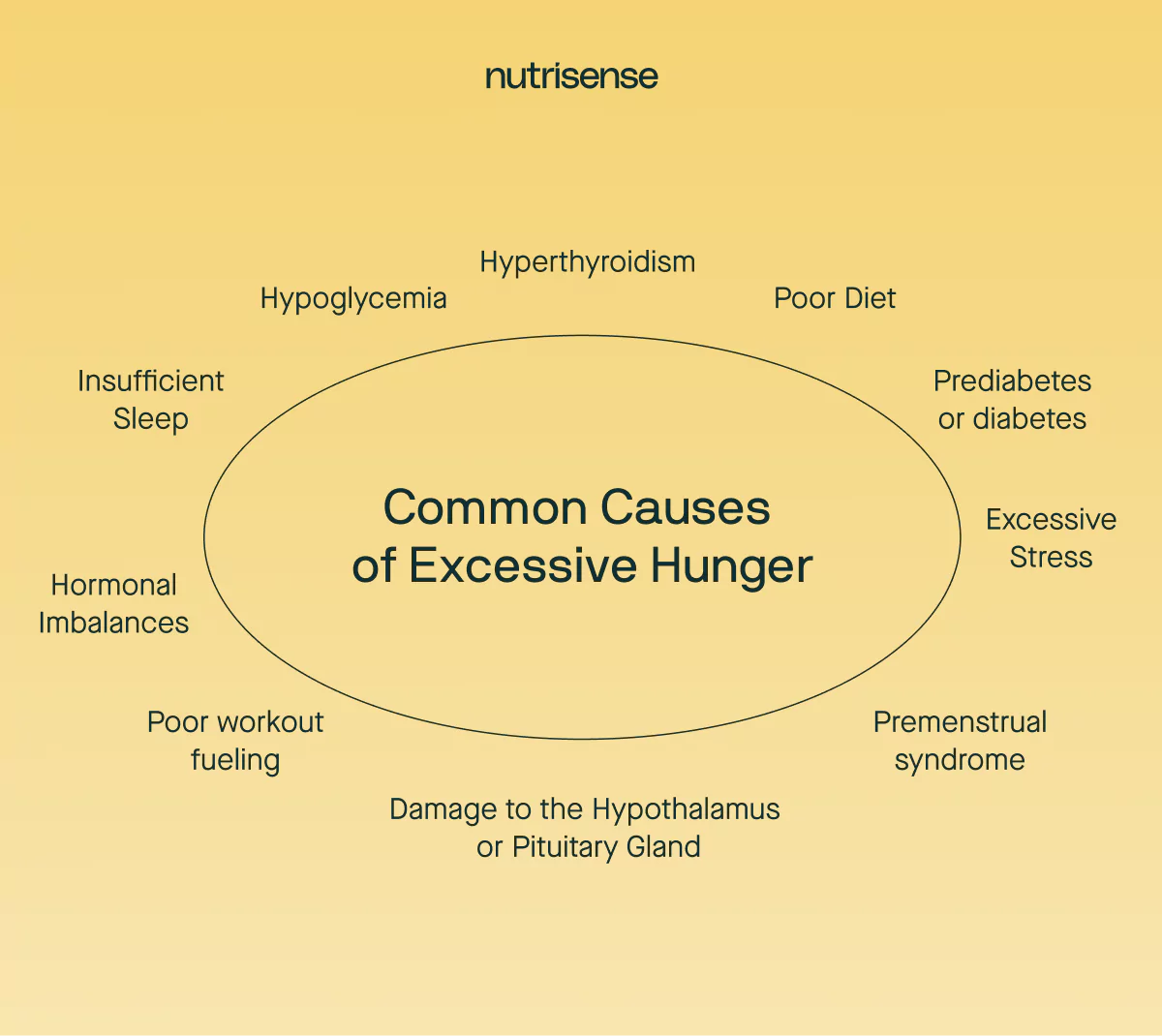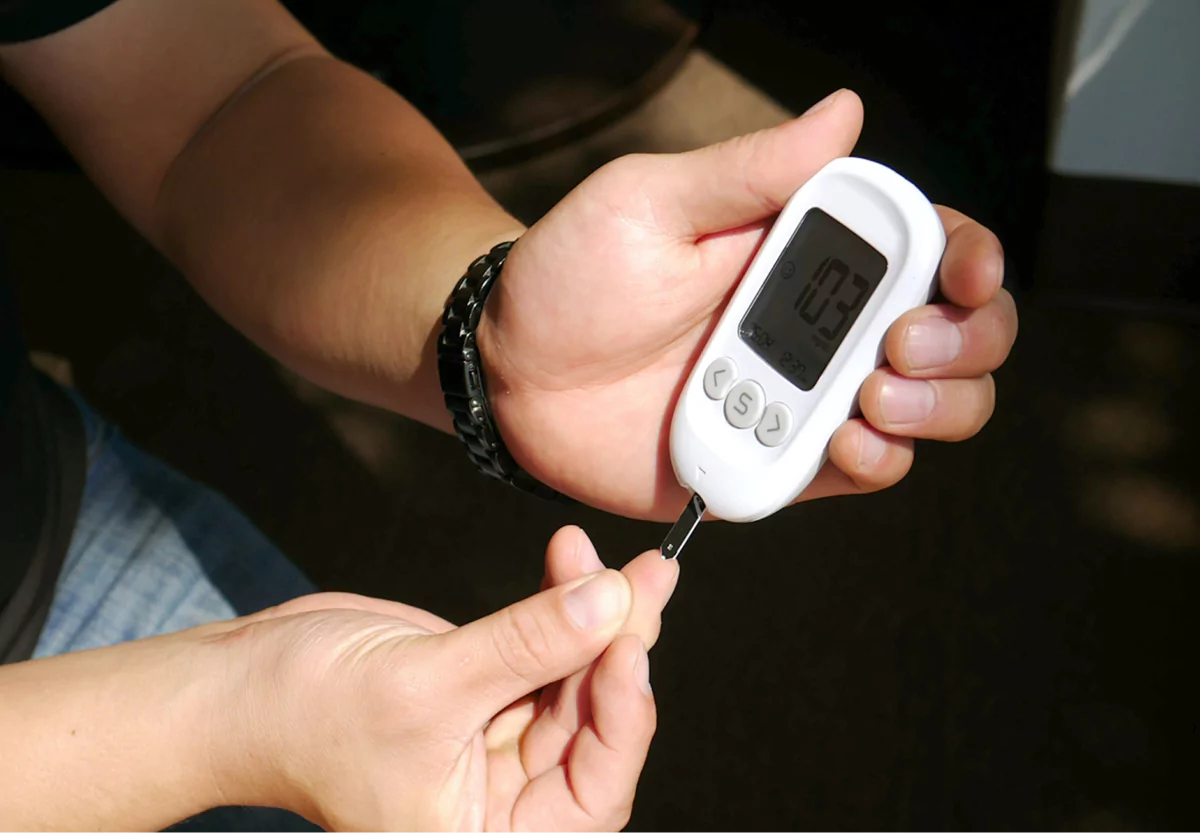14 Causes of Excessive Hunger [AKA Polyphagia or Hyperphagia]
.png)
Key Takeaways
Are you hungry all the time, even after you’ve just eaten? Do you feel hunger cravings that no type or amount of food can ever fulfill?
For most of us, it’s pretty normal for eating habits to change in certain situations, like after extensive periods of physical activity. But for others, this extreme hunger can come from other underlying issues such as disordered eating that can affect your quality of life and may need to be addressed.
Hyperphagia or polyphagia, are the official terms for extreme hunger. These conditions are common among those with diabetes and thyroid issues. However, they can affect anyone and their causes may be different.
In this article, we’ll explore some of the potential causes of hyperphagia and share some tips to address each one.
What is Hyperphagia and What Causes It?

Hyperphagia (or polyphagia) is a condition that causes feelings of uncontrolled hunger (despite eating regularly), extreme food cravings, fluctuations in blood glucose levels, digestive issues, and weight gain. It can occur due to nutritional imbalances, hormonal changes, emotional responses, or genetics.
In most healthy people, the body regulates hunger and satiety through a host of metabolic mechanisms. This allows your body to regulate energy intake and output while ensuring all the vital functions for life are well-maintained.
But if your food intake becomes excessive for longer periods of time, it can lead to certain complications such as changes in digestive function, hormone regulation, and more. As researcher, Jack A. Yanovski, M.D., Ph.D pointed out in the 2nd International Conference on Hyperphagia:
“When we consider categorizing overeating behaviors along a continuum of severity of eating pathology, we see a sequence beginning with overeating/feasting and then moving on to eating in the absence of physiological hunger, loss of control over eating, binge eating, and finally the most extreme form of overeating, hyperphagia.”
Some of the underlying lifestyle-based causes of hyperphagia may include:
- A lack of sleep
- Changes in stress response
- Nutritional imbalances
- Premenstrual syndrome
Excessive hunger is a central feature of inherited disorders such as Prader-Willi syndrome as well as a common sign of diabetes. These conditions can often go hand in hand with binge eating, and if left unaddressed, overeating may lead to obesity issues or weight gain.
While you can use hyperphagia and polyphagia interchangeably as terms for excessive hunger, there are minor differences to note. Polyphagia can be associated with either weight loss, maintenance, or gain, while hyperphagia is always associated with weight gain.
What Does Hyperphagia Feel Like?
The symptoms of hyperphagia are distinct from normal hunger cues that someone might experience after going a few hours without eating. Someone with hyperphagia or polyphagia may experience intense or constant hunger, have difficulty feeling full after a meal, and frequently overeat.
Common Causes of Excessive Hunger

Multiple factors control your food intake as well as your energy balance. After every meal, your body modulates satiety signals that are responsible for inhibiting feelings of excessive hunger. According to bariatric physician, Dr. Kevin Huffman, D.O., of Ambari Nutrition:
"Hyperphagia can have various causes and can differ depending on factors such as your overall health, lifestyle, and underlying medical conditions. Hormonal imbalances are a common root of hyperphagia, specifically involving hormones like insulin, ghrelin, and leptin, which play crucial roles in regulating hunger and the feeling of fullness."
Hormonal signals provide feedback to the hypothalamus, a small part of the brain that controls appetite and lets your body know when you’re full. This helps reduce the desire for food. Hormones such as insulin may also help to inhibit feelings of hunger.
Changes in your body’s ability to produce or respond to insulin may contribute to consant hunger and excessive food intake. At the same time, hypoglycemia, or low blood sugar, can stimulate the secretion of ghrelin, which is one hunger hormone that promotes food intake.
So, why can these factors be linked to excessive hunger? Read on to learn more about the leading causes of polyphagia and hyperphagia.
1) Prediabetes and Diabetes
Diabetes mellitus is a medical condition where the body may not produce enough insulin, or as in the case of type 2 diabetes, doesn’t utilize the insulin that already exists efficiently.
Insulin is a hormone released by the pancreas that suppresses appetite and may lead to a reduction of food intake. It helps to transport glucose into your cells to provide you with energy.
If blood glucose levels are high and insulin is unable to act properly due to low production or insulin resistance, your body may not use glucose for energy efficiently, which means your cells may feel “starved” of the fuel they need. Dr. Huffman continues, "As a result, the body may signal increased hunger to compensate for insufficient energy absorption by cells."
Symptoms of diabetes can also include excessive thirst, or polydipsia, and frequent urination (which is known as polyuria).
Tips
- Consult a registered dietitian or qualified healthcare provider to outline the best nutrition plan for your health.
- Learn more about your condition and your risk factors for hyperphagia by consulting a healthcare professional.
2) Hypoglycemia
After eating, glucose will enter your bloodstream and make its way into the cells with the help of insulin. You may experience hypoglycemia, or low blood sugar levels, for many reasons, including not consuming adequate carbohydrates. Blood sugar can also dip if your body secretes excess insulin or are experiencing other neuroendocrine conditions.
Hypoglycemia promotes the secretion of ghrelin, a hormone that stimulates food intake and regulates blood glucose. It can increase feelings of hunger and may lead to hyperphagia in the presence of an underlying condition.
Tips
- To combat low blood sugar, you may try to eat at specific times of the day
- Make sure you’re eating enough satiety-boosting protein-rich foods and meeting your individual carbohydrate needs.
- Include high-fiber nutrient-dense whole foods like non-starchy vegetables in your diet, which may support stable blood glucose levels.
- Fuel your body for exercise and activity appropriately.
3) Hyperglycemia

Hyperglycemia, or high blood sugar levels, may occur when your body is unable to produce or use insulin efficiently or when glucose production and release into the bloodstream exceeds your body’s capacity to mobilize and metabolize it.
As described earlier, if your cells have trouble absorbing glucose from your blood due to issues with insulin production or sensitivity, your body requests more food, even if you already had a meal. This can lead to a vicious cycle.
Tips
- Try to eat fewer foods with added sugars and processed or refined carbs; focus on protein-rich meals, non-starchy veggies, and moderate amounts of whole fruits and whole grain or starchy veggie sources of carbs to individual glucose tolerance.
- Work with a qualified healthcare professional such as a doctor or a dietitian to manage feelings of excessive hunger without adverse effects on your system, especially if you think you have prediabetes symptoms.
- Work on improving your glucose levels by staying hydrated and managing your stress levels.
4) Hyperthyroidism
Thyroid dysfunctions may have significant effects on body weight and appetite. The thyroid interacts with the hypothalamus and other endocrine centers through the hypothalamus-pituitary-thyroid (HPT) axis to regulate food intake and energy output.
One of the primary roles of the thyroid is to control metabolic rate. If your thyroid produces more hormones than needed, it can lead to issues like hyperthyroidism that may lead to increased feelings of hunger. Graves’ Disease is an autoimmune disorder that may lead to hyperthyroidism.
Tips
- Always consult your doctor when exploring treatment options. What works for one person may not work for another and it’s important to customize your approach accordingly.
- Consult with a qualified nutrition professional such as a registered dietitian to explore any dietary or nutritional factors that may be impacting thyroid health.
5) Lack of Protein In Your Diet

A protein-deficient diet can contribute to excessive hunger for several reasons. First, protein helps regulate the hormones that control appetite, leading to a greater sense of fullness and reduced hunger. Protein-rich foods take longer to digest as well, which can keep you satisfied for a more extended period of time.
Over time, an inadequate protein intake may also lead to muscle loss, which can slow down your metabolic rate, making you more prone to cravings and overeating. To address this issue and prevent excessive hunger, consider these tips:
Tips
- Consult with a qualified nutrition professional such as a registered dietitian or nutritionist to learn more about what works best for your body.
- Consider taking a look at your blood glucose levels regularly using a tool like a CGM to support your overall well being.
- Incorporate lean protein sources into your diet, such as lean meats, poultry, fish, tofu, and legumes.
- Create well-rounded meals that consist of a combination of carbohydrates, proteins, and healthy fats to help maintain steady blood sugar levels and control hunger.
6) Low Fiber Intake
A low intake of fiber in your diet is another factor that can lead to excessive hunger. This is because fiber-rich foods add bulk to your meals, promoting a feeling of fullness and satisfaction.
Fiber also helps stabilize blood sugar levels, which can help prevent the rapid spikes and dips in the glucose curve that can trigger hunger. Here are some tips to help you combat excessive hunger resulting from low fiber intake.
Tips
- Increase whole grains and legumes: Incorporate whole wheat products, brown rice, and beans, and other low glycemic carbohydrates into your diet per your personal tolerance to boost fiber content.
- Consume a variety of colorful fruits and vegetables, as they are excellent sources of fiber that can keep you feeling full.
- Drink plenty of water to aid in digestion and enhance the effects of dietary fiber, helping you manage your hunger more effectively.
7) Inadequate Fat Intake
Dietary fat is another factor that plays a critical role in satiety and appetite regulation. This is because the fat you eat aids in hormone regulation, sending signals to your body that you're full.
When you consume too little fat, your meals may feel less satisfying, leading to increased hunger and cravings. Some essential nutrients, like fat-soluble vitamins, also require dietary fat for proper absorption, and a lack of these nutrients can contribute to ongoing hunger.
Tips
- Eating a variety of fats, including plenty of monounsaturated fats from avocado, olive oil, some seeds and nuts as well as omega 3 polyunsaturated fats from fatty fish and eggs from pastured chickens.
- Consume saturated fats from other animal sources as well as coconut oil may in moderation.
- Be conscious of portion sizes since fats are calorie-dense. Including a moderate amount of healthy fats in your meals can help you feel satisfied without overindulging.
-
8) Excessive Refined Carb Consumption

Ultra-processed and refined carbs usually lack the satiating fiber and nutrients found in whole grains, which can lead to insulin resistance. This can further exacerbate hunger and the desire for more food, as refined carbs are rapidly digested and cause quick spikes and subsequent drops in blood sugar levels, triggering hunger and cravings.
Over time, poor dietary choices may lead to hormonal imbalances, increased susceptibility to infections, poor fitness, and increased risk for chronic health conditions like diabetes. All these health issues can affect hunger and encourage instances of cravings or even hyperphagia.
Here are some tips to address excessive hunger that may be a result of the overconsumption of refined carbs:
Tips
- Replace refined grains like white bread and white rice with whole grain options like whole wheat bread, brown rice, and whole grain pasta to increase fiber and nutrients in your diet.
- Pair your carbohydrates with protein sources and healthy fats like lean meats, fish, nuts, and avocados to help stabilize blood sugar and reduce hunger.
- Be mindful of your carbohydrate intake and portion sizes to avoid overeating, which can lead to blood sugar spikes and increased hunger.
9) Damage to the Part of the Brain That Controls Hunger
Managing your weight after a brain injury of any kind can be a serious issue. But things like hypothalamus injuries may also be a cause of hyperphagia. Since your hypothalamus helps regulate your appetite, damage from injury or a tumor can lead to changes in appetite.
The pituitary gland helps control your body’s hormone levels and interacts with many other endocrine centers in the body. Damage or tumors can cause pituitary dysfunction, leading to hormonal imbalances and changes in appetite and other aspects of metabolic function.
Tips
- Always consult with your doctor to build a plan that is appropriate for your condition and concerns.
- If appropriate, maintain a healthy activity level to prevent undesired weight gain.
- Consider working with a qualified nutrition professional such as a registered dietitian who can help you find ways to boost the nutrient-density of your diet in ways that may help promote brain health and support weight management.
- Reduce emotional stress levels with activities like yoga, breathing exercises, and meditation. Seeking social support can be also helpful.
10) Premenstrual Syndrome (PMS)

Premenstrual syndrome refers to a range of symptoms that you may experience a week or so before menstruation. These might include mood swings, fatigue, irritability, tender breasts, and food cravings.
PMS usually occurs because of hormonal imbalances involving changes in estrogen, progesterone, and even the neurotransmitter serotonin, among others. Serotonin is a neurotransmitter that affects moods, emotions, and cognition as well as other physiological processes such as digestion. Changes in progesterone levels can influence cravings for carbs or sweet foods.
Tips
- Drink plenty of fluids throughout the month to stay hydrated. It’s especially important around the time you usually get your period, as it may help with pain reduction.
- Work with a registered dietitian or nutritionist to help you assess nutrient intake and improve glucose levels at different phases of your menstrual cycle, depending on your body’s specific needs.
11) Increased Exercise
For some people, increased exercise can lead to heightened hunger. This is because physical activity burns calories and can increase your metabolic rate, increasing the body's energy demands.
Strenuous workouts can also deplete glycogen stores in muscles, prompting the body to crave carbohydrates for replenishment. To manage increased hunger resulting from exercise, here are some tips to keep in mind:
Tips
- After exercise, consume a balanced meal that includes a mix of carbohydrates, proteins, and healthy fats to replenish energy stores and promote satiety.
- Opt for healthy, nutrient-dense snacks like fruits, yogurt, or whole-grain crackers to curb post-exercise cravings without overindulging in empty calories.
12) Too Much Stress

You might have heard of “emotional eating.” But just in case you’ve never experienced it, this may occur when you draw emotional comfort from eating. It can happen when you experience high levels of stress and might find yourself reaching for not-so-healthy foods to satisfy these cravings.
Wondering why this is the case? There are many reasons. One of which may relate to how stress increases cortisol secretion. This hormone increases appetite and food cravings.
In addition to emotional stress factors, stress can also come from other areas of our lives such as poor nutrient balance, not fueling well enough for our workouts, or even higher intake of things like caffeine and alcohol—especially if you aren’t tolerating them well.
Tips
- For more detailed tips on understanding stress and stress-reduction, check out our article all about stress.
- Try yoga classes or meditation to help manage your stress levels.
- Limit many processed foods and added sugars and instead focus on eating a whole foods-based nutrient-dense diet. To find what works best for your body, consider working with a registered dietitian who can help you customize your approach more appropriately.
- Try to reduce stressful activities in your daily life. If you have a high-pressure job, consider maintaining a better work-life balance to manage your stress levels.
13) Not Enough Sleep
Not getting enough sleep is actually a type of stress in itself! Getting enough (good quality) sleep is crucial to maintaining good health. A lack of sleep can increase levels of ghrelin, the hunger hormone, and a decrease in leptin, the satiety hormone.
This may lead to increased feelings of hunger, so it is important to prioritize getting enough sleep. Everyone’s body is different, but most experts recommend at least seven or more hours a night for adults.
Getting inadequate sleep can have negative effects on your mental health and increase the risk for other adverse health conditions.
Tips
- Make sure to aim for at least seven hours of sleep every night.
- Ensure that the sleep you get is of good quality—aim for as much uninterrupted, restful sleep as possible.
- Limit daytime naps, and stick to the same sleep schedule every day to improve your sleeping habits.
- Include appropriate levels of physical activity in your daily routine to help you sleep better at night.
- If you struggle with sleep regularly, consider talking with your doctor to identify any underlying conditions that might be present.
14) Leptin Resistance

Hormone imbalances of many types can affect your health and weight. Certain hormones can influence body fat distribution, which may lead to weight gain or loss. For example, leptin is the satiety hormone released by the fat cells. It helps regulate food intake and energy expenditure in the long term.
If your body has an excess of fat tissue, this could lead to the release of large amounts of leptin. Unfortunately, this can cause a resistance to leptin, which means that even though you eat enough food, you might not feel full.
Even low levels of leptin can cause hyperphagia. When your body doesn’t produce any leptin, your brain thinks that your body doesn’t have any fat tissue. It can lead to uncontrolled and excessive hunger, leading to weight gain.
Tips
- If you struggle with achieving and maintaining a healthy weight or understanding your hunger and fullness cues, it’s important to speak with your doctor and consider working with a dietitian. Your healthcare team may work together to help you maintain a healthy body fat percentage for hormonal balance.
- Like so many of the tips above, it may be important to aim for a nutrient-dense diet low in processed foods and added sugar. To help you customize your diet, you’ll want to consult with a qualified nutrition professional.
Why Am I Suddenly So Hungry as a Woman?
If you’re a woman who is experiencing a sudden increase in hunger, there are a few specific factors that may be contributing to this. Hormonal fluctuations, such as those occurring during the menstrual cycle or pregnancy, can lead to increased appetite.
Sex hormones play an important role in appetite regulation and eating behavior in women. Estrogen inhibits food intake, whereas progesterone and testosterone may stimulate appetite. Levels of these hormones fluctuate during the menstrual cycle, pregnancy, lactation and menopause.
For some women, certain medical conditions can impact appetite regulation, potentially leading to increased hunger as a side effect. For example, in one study, females were found to have significantly higher incidence of hyperthyroidism than males. This condition can make you feel hungrier because it increases your metabolic rate and can lead to excessive calorie expenditure, prompting the body to seek more food to meet its energy demands.
Graves' disease is the most common cause of hyperthyroidism in the United States, and is five times more likely to affect women than men. It's essential to consider these various factors when assessing sudden changes in appetite.

Find the right Nutrisense programto turn insight into progress.
Go Beyond Glucose Data with Nutrisense
Your glucose can significantly impact how your body feels and functions. That’s why stable levels are an important factor in supporting overall wellbeing. But viewing glucose isn't enough. Nutrisense, you’ll be able to learn how to use your body's data to make informed lifestyle choices that support healthy living.
One-to-one coaching
Sign up to access insurance-covered video calls to work with a glucose expert: a personal registered dietitian or certified nutritionist who will help tailor your lifestyle and diet to your goals.
Monitor and measure what matters
With the Nutrisense CGM Program, you can monitor your glucose with health tech like glucose biosensors and continuous glucose monitor (CGM)s, and analyze the trends over time with the Nutrisense App. This will help you make the most informed choices about the foods you consume and their impact on your health.
Find your best fit
Ready to take the first step? Start with our quiz to find the right Nutrisense program to help you take control.

Heather is a Registered and Licensed Dietitian Nutritionist (RDN, LDN), subject matter expert, and technical writer, with a master's degree in nutrition science from Bastyr University. She has a specialty in neuroendocrinology and has been working in the field of nutrition—including nutrition research, education, medical writing, and clinical integrative and functional nutrition—for over 15 years.


.webp)

